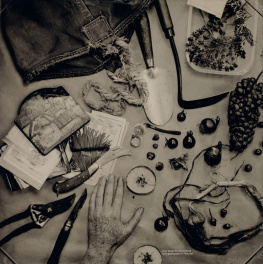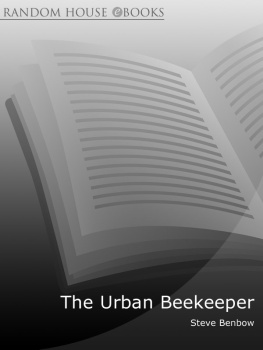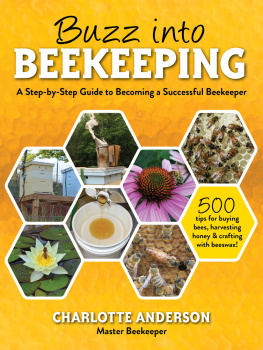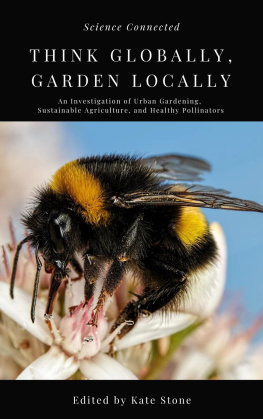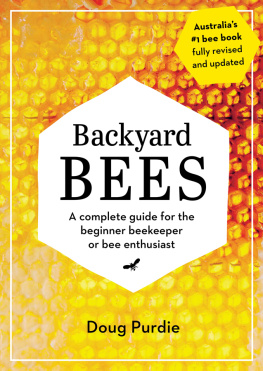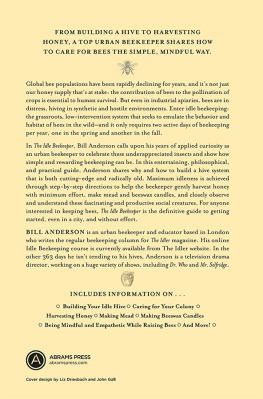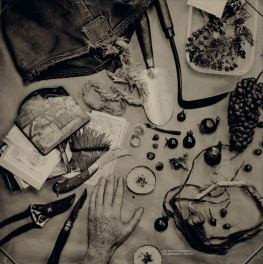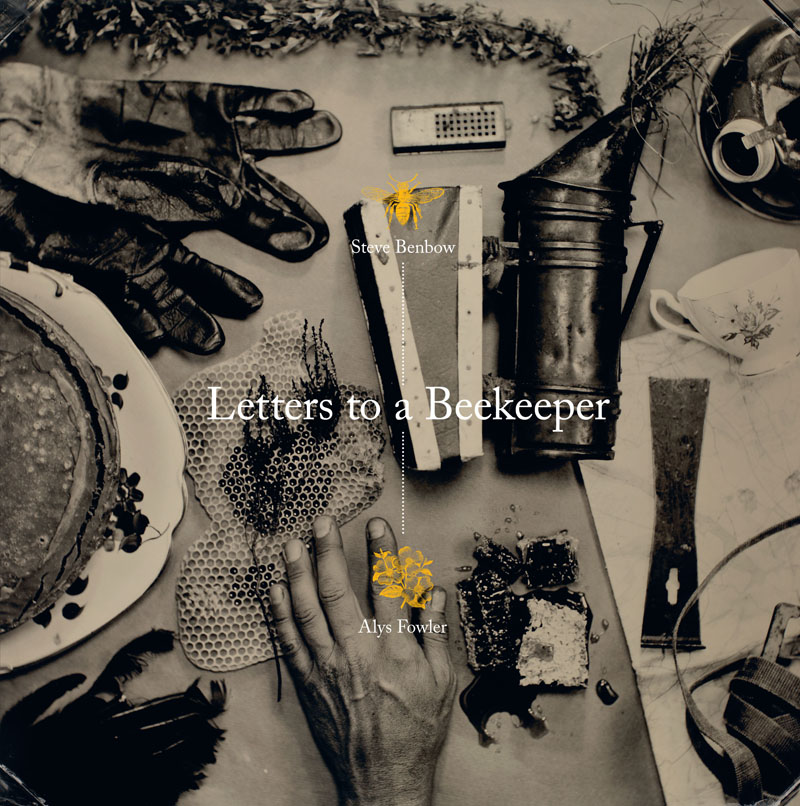
This edition first published in 2017
Unbound
6th Floor Mutual House
70 Conduit Street
London W1S 2GF
www.unbound.com
All rights reserved
Steve Benbow & Alys Fowler, 2017
The right of Steve Benbow & Alys Fowler to be identified as the authors of this work has been asserted in accordance with Section 77 of the Copyright, Designs and Patents Act 1988. No part of this publication may be copied, reproduced, stored in a retrieval system, or transmitted, in any form or by any means without the prior permission of the publisher, nor be otherwise circulated in any form of binding or cover other than that in which it is published and without a similar condition being imposed on the subsequent purchaser.
Steves bee image Patrick Guenette
Alyss flower image nicoolay
Bee illustrations Chris Shields
Tintype images, pp. 38 & 44 Tif Hunter
Mr Holmes photograph, p. 147 Photo 12 / Alamy Stock Photo
All other photographs Steve J. Benbow
Designed by Holmes Wood
A CIP record for this book is available from the British Library
ISBN 978-1-78352-115-9 (trade hbk)
ISBN 978-1-78352-117-3 (ebook)
ISBN 978-1-78352-116-6 (limited edition)
Printed in Italy by L.E.G.O. S.p.A.
This book is dedicated to all those
who plant the seeds
that feed the bees
Dear Reader,
The book you are holding came about in a rather different way to most others. It was funded directly by readers through a new website: Unbound. Unbound is the creation of three writers. We started the company because we believed there had to be a better deal for both writers and readers. On the Unbound website, authors share the ideas for the books they want to write directly with readers. If enough of you support the book by pledging for it in advance, we produce a beautifully bound special subscribers edition and distribute a regular edition and e-book wherever books are sold, in shops and online.
This new way of publishing is actually a very old idea (Samuel Johnson funded his dictionary this way). Were just using the internet to build each writer a network of patrons. At the back of this book, youll find the names of all the people who made it happen.
Publishing in this way means readers are no longer just passive consumers of the books they buy, and authors are free to write the books they really want. They get a much fairer return too half the profits their books generate, rather than a tiny percentage of the cover price.
If youre not yet a subscriber, we hope that youll want to join our publishing evolution and have your name listed in one of our books in the future. To get you started, here is a 5 discount on our first pledge. Just visit unbound.com, make your pledge and type BEEKEEPER in the promo code box when you check out.
Thank you for your support,

Dan, Justin and John
Founders, Unbound
CONTENTS
Beginning

Steve Benbow

Alys Fowler

I dont know who was responsible for getting us together in the first place the wildly independent gardener and lover of damp tweed, goat wool socks and small dogs with the destitute vagrant and nomadic beekeeper. It could have been an enthusiastic press officer or a literary festival organiser, but however it happened, we found ourselves speaking at the Edinburgh Festival together, promoting our new books. To whoever it was, I would like to say: It was a bold, inspired arranged marriage.
If you look at the photographs taken that day, Im clean shaven and coiffed. It had been the first night Id slept in a bed for almost two years, not only that, but it was a king-size with six pillows and crisp starched sheets. For the first time in a long time, I was not looking, as my grandfather used to say, like Id been pulled through a hedge backwards.
We knew very little about each other. While I had taken advantage of free overnight accommodation, Alys was jetting in from Brum for the day. We met for a light lunch at The Dogs on Hanover Street, to go over the running order before our event. I was giving out jars of honey as a way of an introduction and perhaps also to show how marvellous my bees were at producing delicious stuff. Alys, with delicate beads of coral and tumbling hair of a similar colour, appeared delighted with my offerings or she was just very polite about my bumbling nervousness.
Later that day, on stage in the venues giant felt yurts, Alys positioned herself as the lone centre forward, skilfully weaving through the audiences tricky questioning with ease. Me, well, I was the clumsy, shy defender, hands in pockets, fumbling around the halfway line, getting flustered when the ball was booted in my direction.
But as I stood and listened from the side of the stage, I realised how incredible her horticultural knowledge was. She seemed to understand everything that lay in the ground and sprouted, shooted, budded, flowered and fruited. I wondered what she knew about bees if shed ever considered keeping them?
She was cautious when I asked her: she was well aware they required a huge amount of commitment and vigilance. But shed been a country girl once, kept chickens and, like me, spent the majority of her days working the land.
Back in London, homeless and quite destitute, my ingenious and resourceful bees were my only real form of income. They gave me food for the table and a roof over my head, albeit a cold, damp warehouse in Bermondsey with asbestos sheeting. But it was all provided by the sale of their incredible honey. In a very crude and essential way, my bees were keeping the wolf from the door.
I had made a conscious decision not to get a flat when I moved back into town but to prioritise somewhere for my hives and equipment to be stored. I slept rough around the bee sites I had, either by camping or bedding down on the floor of my van. Then in the sodden roof space cavity of the vast warehouse, I would curl up like a dog, hoping that no one disturbed me.
My bees had always managed to flourish in the city, from the first day I brought them to the capital almost twenty years ago, in the back of my neon-green VW Golf. They were immense grafters from the off, a bit like me, able to scratch a living from what was around them and in their case, finding good extensive forage, in the most unlikely of settings.
The Bees installation at the Tate was the brainchild of one of the directors who had heard about my bees on London rooftops and recruited my services. At Tate Britain apiary, the bees foraged on the gigantic lime trees and fantastic vigorous nectar-yielding trees, aptly named Trees of Heaven. These both produce the most aromatic nectar from mid June for about three to four weeks and if the weather conditions are right, a bumper harvest for all.
However, it is the early season pollen my critters crave at key stages of the colonys expansion. As the days become longer and the temperatures stabilise, the brood nest requires pollen for grub and larvae development and I had always loved the idea of a fast food pit-stop right below where they live, to keep them topped up with treats and gems for their expansion.
The original Tate art gallery was established by a chap who ironically made his living from another sweet substance sugar. In the centre of the complex is the staff garden, a strip of oblong land about the size of a five-a-side football pitch. Dozens of lichen-covered park benches surround this popular strip, which conveniently receives a good lashing of sun from lunchtime onwards. That was the site I wanted for my bug diner: a pollinator paradise in the middle of the city. Not some manicured rose garden or artificial turfed lawn with box hedging, but solitude for all that grazed there. But my knowledge was limited; I didnt have the expertise to build the wilderness.
Next page
